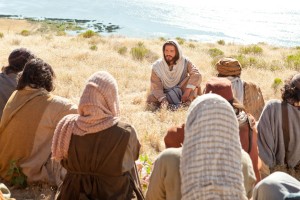The Jesus Way
It has been  said that most pastors have one sermon in them – and that through the years it just gets presented in many different forms. I guess mine has something to do with The Great Commandment (Matthew 22:35-40/Mark 12:28—31/Luke 10:25-28). On my pushy days I will sprinkle in The Great Commission. But because I say it so much, I am confident that you have heard me suggest that we really only need to know five little words in order to understand the basics of Jesus’ Way. And I say it over and over and over again. You can probably guess it by now, but I won’t keep you in suspense—for long. The foundation of all that Jesus said and did–the ground of his teaching–is quite simple. It is the Sparknotes (or Reader’s Digest) version of the Ten Commandments and it forms the basis for Christian Ethics. When asked what was most important, Jesus said these two were the greatest of the commandments to “Love God and love your neighbor.” For my nickel, I find almost everything that Jesus said and did comes down to those five little words, Love God and love your neighbor, including the Sermon on the Mount (do you think Jesus had more than one sermon?).
said that most pastors have one sermon in them – and that through the years it just gets presented in many different forms. I guess mine has something to do with The Great Commandment (Matthew 22:35-40/Mark 12:28—31/Luke 10:25-28). On my pushy days I will sprinkle in The Great Commission. But because I say it so much, I am confident that you have heard me suggest that we really only need to know five little words in order to understand the basics of Jesus’ Way. And I say it over and over and over again. You can probably guess it by now, but I won’t keep you in suspense—for long. The foundation of all that Jesus said and did–the ground of his teaching–is quite simple. It is the Sparknotes (or Reader’s Digest) version of the Ten Commandments and it forms the basis for Christian Ethics. When asked what was most important, Jesus said these two were the greatest of the commandments to “Love God and love your neighbor.” For my nickel, I find almost everything that Jesus said and did comes down to those five little words, Love God and love your neighbor, including the Sermon on the Mount (do you think Jesus had more than one sermon?).
On the surface, this week’s text from the Sermon on the Mount is almost as challenging as last week’s. Last week the text had Jesus teaching about how to be in the image of God when dealing with difficult ethical topics like anger, adultery, divorce, and how we speak about each other. You might say that this part of Jesus’ sermon is inviting us to understand in as expansive a way as possible, what it means to love our neighbor; how to be and live in ‘right relationship’ with others. Just as (last week) we are being invited to be in the image of God when we are angry or lusting after something that is not ours, here, we are called to love the way God loves–choosing to act with compassion and to love without discrimination
The Torah was the revelation of God to the people of Jesus’ day. It contained instruction about how to live in relation to God and one another. Matthew’s gospel uses the term law to refer to the whole content of this teaching. In this portion of the Sermon on the Mount, Jesus uses a rabbinic form of teaching – “You have heard it said…but I say…” – to examine some teachings of the law and expand their boundaries.
Exodus 21:23–24 (“eye for eye, tooth for tooth”) said that an injury could not compel unlimited revenge, but only compensation in direct proportion to the offence. Jesus goes beyond this to counsel non-retaliation. Disciples can fulfill the requirements of the law, and also choose to give more than the law requires. Jesus encourages his hearers to go behind the literal words of the law to discover the love that lies at its heart.
Deuteronomy 24:10ff describes taking a person’s cloak as pledge for a loan. The law required that the cloak be returned at night so that the borrower would have some cover. Jesus calls for generosity: “Give to everyone who begs from you.” In fact, do more than is asked of you. Matthew’s community lived in a hostile society in which a Roman soldier could compel someone to carry his pack for a mile. There were many who demanded revenge for this oppression. Jesus tells his followers that they have the power to choose to do more than is required, to go the extra mile.
Leviticus 19:18 says “love your neighbor as yourself.” Again, Jesus invites disciples to go shockingly farther, loving enemies as well. Love of enemy is a revolutionary idea, especially in an occupied country. Jesus unfolds a deeper understanding of God’s ways–reminding his followers that God’s nature is to love without discrimination.
So okay, it is one thing to hear Jesus’ encouragement to go further than the original teaching. But, then we hear this crazy Word that a) God sends blessings on both the just and the unjust and b) we should “be perfect.” Isn’t this an enormous, maybe even impossible burden? How can one be perfect? Especially when we are talking about loving our enemies and going above and beyond that which is required? Interestingly, the Greek word used here does not mean to be without fault or never to make a mistake. The word means “complete” or “mature.” Christian maturity means showing compassion to all, as God does. This ‘perfection’ actually happens for us when we do the loving that Jesus calls us to. When we love God and neighbor extravagantly, when we are able to expand the boundaries of our concern, we just grow into maturity and wholeness. We become complete and these seemingly impossible expectations for loving our neighbor, this Way of Jesus becomes our way. It becomes second nature (or at least it becomes what we try to be).
 What a wonderful challenge for us to consider. How do we live into these ways? How do we live without retaliation while prophetically seeking justice? How can we be examples of Jesus’ Ethics to our society? Will people know we are Jesus’ followers by the way we follow Jesus’ teachings and expand the boundaries of our love and care for others? I pray that it may be so.
What a wonderful challenge for us to consider. How do we live into these ways? How do we live without retaliation while prophetically seeking justice? How can we be examples of Jesus’ Ethics to our society? Will people know we are Jesus’ followers by the way we follow Jesus’ teachings and expand the boundaries of our love and care for others? I pray that it may be so.
With blessing and prayer,
Rev. Wendy Miller Olapade/revwdmiller@comcast.net
